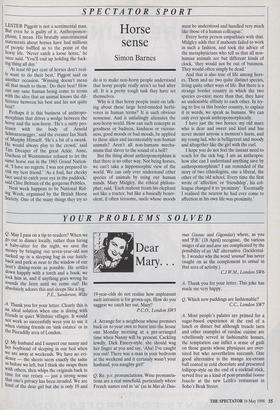SPECTATOR SPORT
Horse sense
Simon Barnes
LESTER Piggott is not a sentimental man. But even he is guilty of it. Anthropomor- phism, I mean. His brutally unsentimental statements about horses have had millions of people baffled as to the point of the horsy life. 'Never catch a loose horse,' he once said. 'You'll end up holding the fuck- ing thing all day.'
At least 60 per cent of horses don't real- ly want to do their best,' Piggott said on another occasion. 'Winning doesn't mean all that much to them.' Do their best? How can any sane human being come to terms with the idea that an animal knows the dif- ference between his best and his not quite best?
Perhaps it is this business of anthropo- morphism that drives a wedge between the horsy and the non-horsy. 'He's a nutty pro- fessor with the body of Arnold Schwarzenegger,' said the eventer Ian Stark of Murphy Himself. `He's a bit of a swank. He would always play to the crowd,' said Tim Dreaper of the great Arkle. Anne, Duchess of Westminster refused to let the same horse run in the 1965 Grand Nation- al. 'I have no regrets. I was not prepared to risk my best friend.' As a foal, her cheeky face used to catch your eye in the paddock,' said Clive Brittain of the gorgeous Pebbles. Next week happens to be National Rid- ing Week, organised by the British Horse Society. One of the many things they try to do is to make non-horsy people understand that horsy people really aren't so bad after all. It is a pretty tough task they have set themselves.
Why is it that horsy people insist on talk- ing about these large herd-minded herbi- vores in human terms? It is such obvious nonsense. And it unfailingly alienates the non-horsy world. How can such concepts as goodness or badness, kindness or vicious- ness, good moods or had moods, be applied to these alien and incontestably non-human animals? Aren't all non-humans mecha- nisms that slaver to the sound of a bell?
But the thing about anthropomorphism is that there is no other way. Not being horses, we can't take a hippomorphic view of the world. We can only ever understand other species of animals by using our human minds. Mary Midgley, the ethical philoso- pher, said, 'Each mahout treats his elephant not like a tractor, but like a basically benev- olent, if often tiresome, uncle whose moods must be understood and handled very much like those of a human colleague.'
Every horsy person empathises with that. Midgley adds that if mahouts failed to work in such a fashion, and took the advice of the metaphysicians who tell us that all non- human animals are but different kinds of clock, 'they would not be out of business. They would often simply be dead.'
And that is also true of life among hors- es. Them and us: two quite distinct species, living quite other ways of life. But there is a strange border country in which the two species co-exist; more than that, they have an undeniable affinity to each other. In try- ing to live in this border country, to explain it in words, we speak as humans. We can only ever speak anthropomorphically.
I have just the two horses: my old mare who is dear and sweet and kind and has never meant anyone a moment's harm, and my young lad, who is belligerent and moody and altogether like the girl with the curl.
I hope you do not feel the instant need to reach for the sick bag. I am an anthropos: how else can I understand anything save by anthropomorphism? I am reminded of the story of two ethnologists, one a liberal, the other of the old school. Every time the first wrote of 'affection' or `friendship', his col- league changed it to 'proximity'. 'Eventually I realised the nearest he had ever come to affection in his own life was proximity.'


























































 Previous page
Previous page